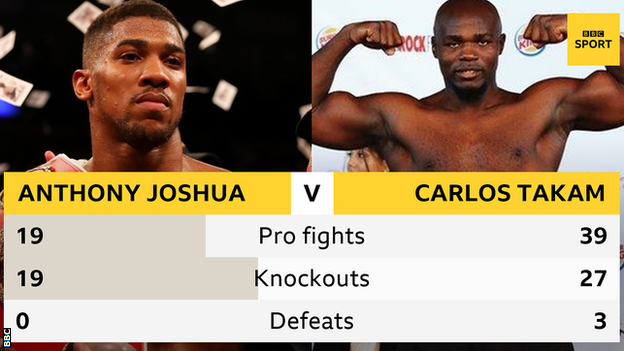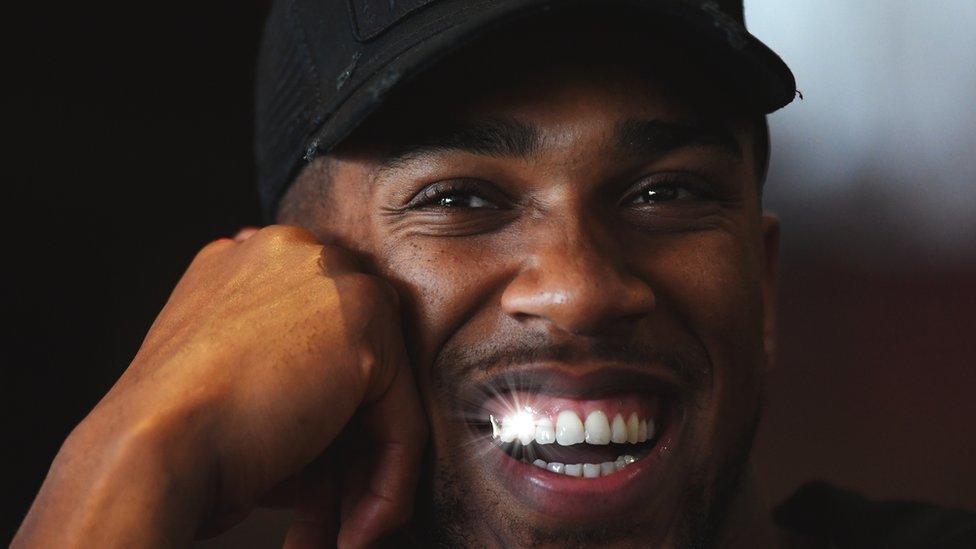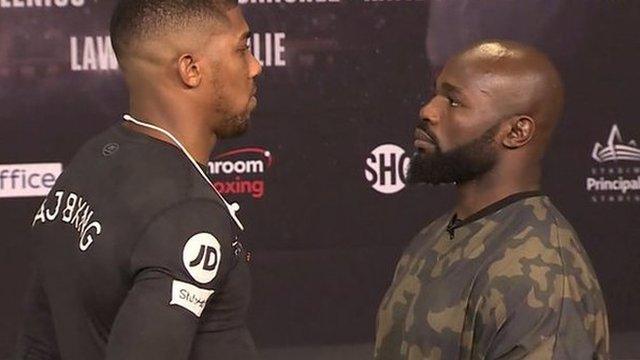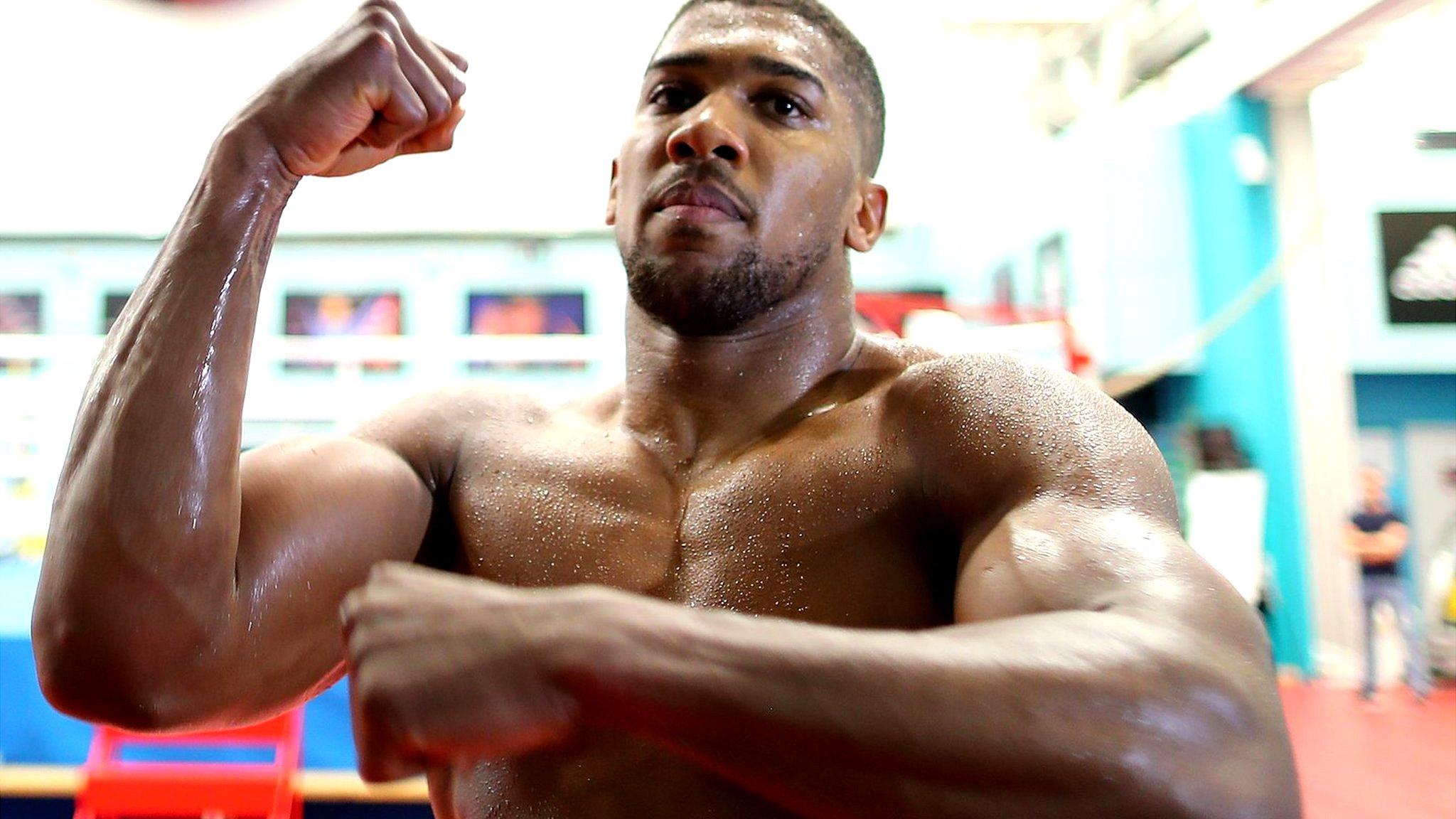Anthony Joshua well placed to create sustainable legacy
- Published
- comments
Could you match Anthony Joshua's workout routine?
Anthony Joshua v Carlos Takam |
|---|
Venue: Principality Stadium, Cardiff Date: Saturday, 28 October Time: 22:00 BST approx |
Coverage: Live text commentary on the BBC Sport website and app from 20:00 BST |
"The heavyweight championship will drive people crazy. You know that right? It's like a crown of thorns."
In a BBC Radio 5 live boxing podcast earlier this year, Mike Tyson spoke from experience in describing the burdens that come with the glory for the owners of the prize once labelled the richest in sport: "Everyone wants to use you for something. It's like being the President of the United States."
Floyd Patterson, who won the title on the retirement of Rocky Marciano in 1956 - and who was trained by Tyson's mentor Cus d'Amato - told me in an interview 25 years ago how, as the heavyweight kingpin, he seemed to attract a "friend" for every dollar he earned.
The splintering of the honour has removed some lustre in more recent years, with the title split as many as four ways since the inception of the newest world governing body, the WBO, in 1988.
Britain's world heavyweight champion Anthony Joshua appears well-equipped to ward off the devious and the dubious but, as Tyson explained, the wellbeing of a heavyweight hero is determined as much by his control of matters outside the ring as his wisdom and steeliness in the heat of battle.
Family and friends - doubling up as advisers - help to form a protective cloak and have ensured so far that passions are rationed in gaining access to Joshua, while building the profile of an advertisers' dream whose ascent has been uncommonly steep and whose profile has limits beyond the skies.
Joshua has the punch, the style and the personality to generate the kind of excitement missing from the division since the days of Tyson and Lennox Lewis, Evander Holyfield and Riddick Bowe. "A fighter from the past," is the description of George Foreman.
In Cardiff on Saturday, Joshua takes on Carlos Takam in what is only his 20th professional contest.
A quarter of his career is made up of world title action. For context, at the same stage:
Muhammad Ali beat Sonny Liston to become world champion for the first time;
Lewis fought for the British, European and Commonwealth titles against Derek Williams;
And Tyson was taken the distance for the first time as a professional when nullified by James Tillis (Tyson would become world champion eight fights - and six months - later).
Joshua is well placed to create a sustainable legacy. Modern demands will limit his appearances to two, possibly three, fights a year. This was the case for Wladimir and Vitali Klitschko, as well as Lewis, during their reigns as champion.
Commitment to the promotion of pay-per-view attractions and the wear and tear on the body are contributory factors.
We take a look at the history of world title fights held in Cardiff
Joshua revels in the study of heavyweight history and oozes respect in conversation about the likes of Larry Holmes. During an interview this month at his training camp in Sheffield, Joshua finished my sentence when I compared his recovery from a heavy sixth-round knockdown against Wladimir Klitschko at Wembley Stadium last April to Holmes' mid-fight revival against Earnie Shavers back in 1979.
Joshua went on to discuss the near-barbaric up-and-downer between Foreman and Ron Lyle of 1976 and smiled as he hoped his exploits would one day be remembered with the same degree of fondness.
Like the best of them, Joshua can swap a ready smile for ruthless smack-talk when the situation arises - and gave a clear warning to Klitschko after being decked at Wembley of what would happen if the Ukrainian let him get through that sixth round.
On returning to his corner, Joshua told his trainer Robert McCracken that he would take a round off in the seventh to recuperate. Such composure in a high-pressure, high-profile "trenches" moment was remarkable and sent a message to all opponents from here on that when Joshua is down, he is not necessarily out.

Foreman believes a showdown against the American Deontay Wilder, holder of the WBC belt, ranks as the biggest event waiting to be made in world boxing.
Joshua would start favourite but Wilder's story is strikingly similar and his power creates similar edge-of-the-seat anticipation. With 56 knockouts between them in 57 fights, the promotional poster requires little in the way of creative thinking.
The WBO champion Joseph Parker retained his title but shed some credibility in outpointing Hughie Fury in Manchester last month. Joshua is quoted by bookmakers at odds of 1/20 to beat Parker, should they meet, and the one-sided nature of the proposition could be balanced by the opportunity for the Briton to make history. No heavyweight has ever held all four versions of the world title simultaneously.
Just turned 28, Joshua has talked of spending another decade in the sport and a new phase of his career begins on Saturday against the Cameroon-born Frenchman Takam.
Shocks caused across the decades by Leon Spinks, Buster Douglas, Oliver McCall and others will be familiar to a man so aware of heavyweight history and should provide insulation against complacency.
As Tyson said of Joshua, in our podcast back in June: "It's his time."
Calzaghe belongs at top of British list
Sports Personality: Joe Calzaghe boxing superstar
Memories of a great night at the Principality (then the Millennium) Stadium flowed as easily as his punches once did when Joe Calzaghe joined me and Steve Bunce for a recording of the 5 live podcast to relive the win against Denmark's Mikkel Kessler, external there 10 years ago. Calzaghe produced one of his career-best performances to outpoint a man who carried into the ring an unbeaten record of 39 fights.
Looking out from the middle tier of seating onto the turf being covered for Saturday's heavyweight spectacle, Calzaghe recalled tales of weight-making and punch-taking and gave a detailed, graphic insight into the mentality of an all-time great.
The Kessler fight was Calzaghe's last at super-middleweight. A year and two fights later - wins against Bernard Hopkins and Roy Jones Jr in the United States - he divorced boxing on his own terms.
Hopkins was derided as an "old man" at the time and yet went on to win a world title at light-heavyweight.
Add that success in Las Vegas in 2008 to Calzaghe's wins against Kessler and Jeff Lacy, all within an unblemished 46-fight record, and the picture emerges of a rare talent who, on good days and bad, always found a way to win.
Rankings and comparisons across the ages are difficult to ratify but in the three-decade era of four world governing bodies, Calzaghe belongs at the top of the British list.
Boxing's SPOTY legacy
Calzaghe's success against Kessler came at the start of a heady five-week spell rarely highlighted in British boxing.
The following weekend in November 2007, David Haye knocked out the Frenchman Jean-Marc Mormeck in the suburbs of Paris to claim the WBA and WBC versions of the world cruiserweight title.
And in early December, Ricky Hatton was followed to Las Vegas by hordes in their thousands as he succumbed in 10 rounds to Floyd Mayweather. Hatton, Haye and Calzaghe were characters whose varied personalities shone a glaring light on their sport from different angles.
The morning after Hatton's defeat (US time), a makeshift studio was assembled by BBC production staff in the same MGM Grand Garden Arena for the purposes of a segment within the live broadcast of the Sports Personality of the Year programme. Hatton was voted into third place, in the competition won by Calzaghe., external
No boxer has finished in the top three since. They were special times.
- Published27 October 2017

- Published26 October 2017

- Published24 October 2017

